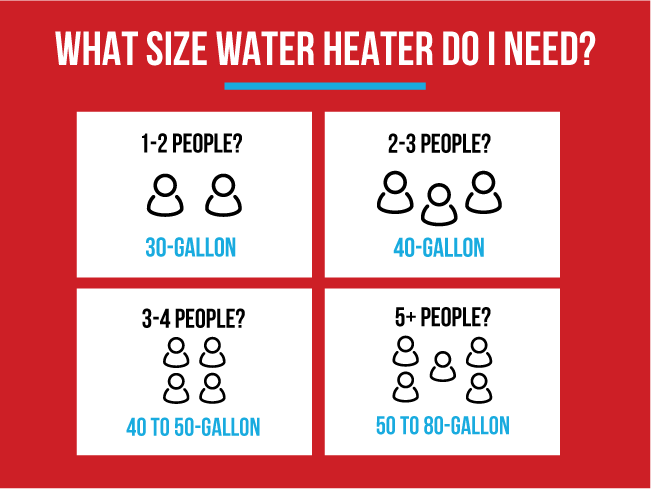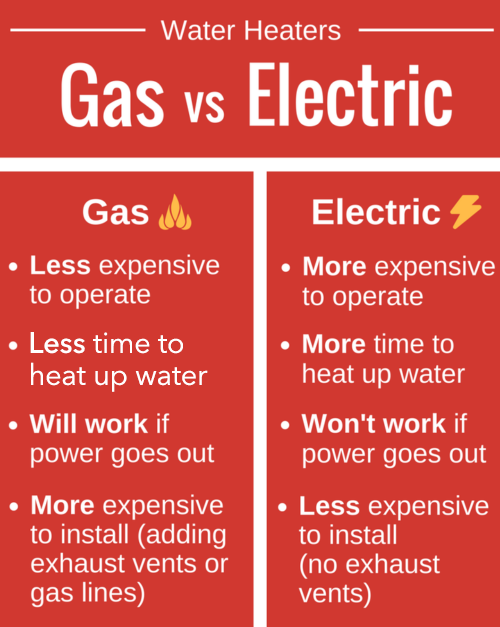What Type of Water Heater Do I Need For My Home?
July 13, 2023
Unless you enjoy cold showers (some of us do!), you expect hot water when you turn on the shower. In Arizona especially, you also expect the hot water to arrive within seconds, not minutes. If you don’t get hot water quickly or you’re noticing that the water isn’t hot for long, you may need to replace your water heater. The next question our homeowners ask when they get an inspection is, What type of water heater do I need?
You have options when it comes to installing a new water heater. Size is an important consideration when you’re replacing a water heater, but the cost of tank vs. tankless water heater installation is another factor to keep in mind. When choosing a new water heater for your home, you must consider the need for a tank vs tankless water heater, the size of your home, the fuel source for the new water heater, and more. Explore our guide to determine the best water heater for your home and to learn more about the Patrick Riley | Isley’s customer service difference.
Consideration #1: Tank vs. Tankless Heater
Before searching for the most affordable or highest-rated water heater on the market, you first must determine if installing a tankless water heater is right for your family. A tank water heater stores and heats water, keeping it ready for use when you turn on your faucet. A tankless water heater, often referred to as an “on-demand water heater,” doesn’t store water. It heats water instantly when you turn on your faucet.
So, is a tankless heater right for you?
- A tank water heater makes hot water available for any room in the house that may need it at the same time, such as when one member of the family showers while the dishwasher is running. Tank water heaters are recommended for large families because their demand is often higher.
- A tankless water heater will prioritize certain rooms over others when it comes to hot water. Patrick Riley | Isley’s plumbing experts will often install these to work with bathrooms and kitchens. These heaters are small and can be installed in narrow spaces if needed. If you have a smaller house and fewer people living in it, a tankless heater makes more sense for your household.
When it comes to price, tankless water heater installation costs can be significantly higher. However, you’ll save money in the long run, as tankless water heaters are more energy and cost efficient.
Consideration #2: Water Heater Size
When we classify water heaters based on their size, we often consider the size and capacity of their tanks for a specific number of family members. The more water tank capacity you need for people in your home, the more costly the heater will be. Water heater capacities can range anywhere from 20–80 gallons.

Choose a Size Based on Peak Hour Demand
Peak hour demand is the more accurate method of determining how much water your home uses in a given period of time. “Peak hour demand” refers to the number of gallons of hot water the family needs during the busiest hour of the day. You can calculate this number by visiting www.energy.gov. You can use the equation to determine peak hour demand or schedule an appointment with a Patrick Riley | Isley’s plumbing expert to discuss the specifics.
After you calculate the peak hour demand, consider the first hour rating (FHR) of each water heater you own. FHR refers to the largest amount of water that the heater can warm up at any given hour. This number should fall within 1–3 gallons of the peak hour demand in order to be a good fit for your home. For instance, if your peak hour demand is 42 gallons of hot water, you’ll need a heater with an FHR of 39–45.
Consideration #3: Fuel Source
The two most common fuel sources for water heaters are electricity and gas.
If your home already has gas lines, no problem! While they’re more expensive to install, they heat water in record time and aren’t part of the home’s power grid, so you can enjoy hot water even in a power outage. One exception is the tankless gas water heater, which does require electricity to run.
While these heaters require electricity and tankless water heater installation costs can be higher, this unit may be right for your family. Electric powered water heaters plug into a wall outlet, so while you won’t have hot water if the power goes out, running them is less expensive.

Consideration #4: Efficiency
When a water heater is “energy efficient,” it uses less power to run, which is great for your utility bills. The tradeoff is that these machines will cost more to install up front.
Water heater efficiency is measured by its Energy Factor (EF). The higher the EF, the more efficient the water heater will be.
- For most gas water heaters, the EF ranges from 0.58–0.60.
- For electric water heaters, the EF is a minimum of 0.9.
A water heater’s EF is achieved through several factors:
- How efficiently the heater transfers heat to the water in its tank
- How much heat is lost from stored water (manufacturers consider this “standby heat loss”)
- How much heat is lost when water travels through the tank and pipes.
Find out a water heater’s EF rating by searching for it on the tank’s manufacturing label. Or if you’re looking for heaters online, look in the product details (see image below).

Ready to Replace Your Water Heater? Contact Patrick Riley | Isley’s Plumbing Experts
You have options when it comes to choosing your new water heater and what best fits your home. When choosing a new water heater for your home, you should consider the need for a tank vs tankless water heater, the size of your home, the fuel source for the new water heater, and more.
When you're looking for the right water heater for the home and exploring tank vs. tankless water heater installation costs, Patrick Riley | Isley’s can help you every step of the way. Arizona homeowners across Greater Phoenix trust us as their reliable handymen for all their drainage issues and plumbing needs.
Written by: Patrick Riley Cooling, Heating, & Plumbing
Get 10% off (Up to $150)

Ty Lindsay is the Director of Field Operations at Patrick Riley | Isley’s and a 15-year veteran of the plumbing and HVAC trades. In 2010, Ty earned his Journeyman’s plumbing license. He became a Master Plumber five years later and earned his Journeyman HVAC technician’s license that same year. Ty’s breadth of knowledge in plumbing and HVAC includes both residential and commercial work. He’s been a loyal member of the Patrick Riley | Isley’s team since 2016.
- Posted in:
- Buyer's Guide
